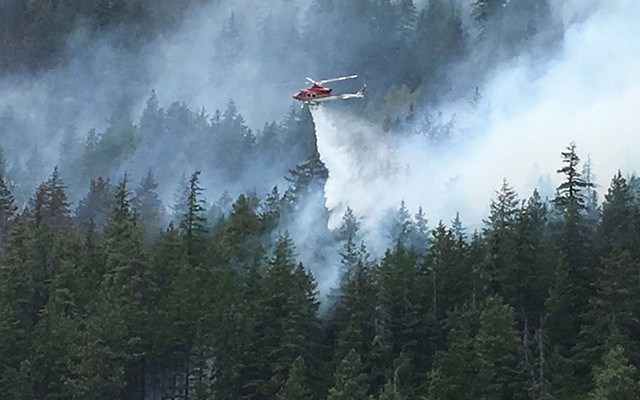The board of the Squamish-Lillooet Regional District (SLRD) isn't ready to demand accountability of the world's largest oil producers—at least not until it takes a closer look at its own backyard.
At the SLRD's regular meeting on Jan. 30, the board debated a motion to join the more than 16 communities across B.C. sending "climate accountability" letters to the world's 20 biggest oil producers.
(Whistler's own "climate accountability" letter drew fierce opposition from the Canadian oil industry in December: www.piquenewsmagazine.com/whistler/whistler-climate-change-letter-draws-ire-of-fossil-fuel-industry/Content?oid=12534419)
After a brief discussion, the board moved to receive the letter and refer it to SLRD strategic planning to develop a corporate and regional greenhouse-gas reduction plan.
"We've got strategic planning coming up in April, and that is our time to put this on the table, and say what are we going to do, as a region, to address this? Because if we point the finger, three of those fingers are still pointing back at us," said Squamish Mayor Karen Elliott, adding that the first goal in Squamish's strategic plan for 2019 is to do its own community energy and emissions plan.
"I think that is our job as a board, is to take a good hard look at ourselves, and then we can start holding other people accountable."
SOME THOUGHTS ON 'RIDE-HAILING'
In response to a call for submissions on ride-hailing services such as Uber and Lyft, the SLRD board opted to boil its response down to five key points: The provincial government should provide protections for rural areas to ensure that ride-hailing services are available and not just pulled to larger urban areas (i.e. not delivering services in the rural areas that need these services); Class 4 driver licenses for all drivers providing ride hailing services should be a requirement for safety reasons; the data that the provincial government collects regarding ride-hailing services is to be made public; ride-hailing services should be required to develop and implement a system for measuring their greenhouse-gas emissions as well as their impact on traffic congestion; the provincial government should provide a level playing field for the taxi industry and ride-hailing services.
The provincial all-party Select Standing Committee on Crown Corporations is tasked with examining and making recommendations on ride hailing in B.C.
The Committee must report to the Legislative Assembly by March 31, 2019.
WHAT MAKES A TIME CAPSULE?
Also at its Jan. 30 meeting, the SLRD board contemplated how best to approach its 50th-anniversary time capsule.
So far, the district has amassed two SLRD pencils, two SLRD pins, a Canadian Silver Dollar from 1968, a Squamish banner, some newspaper clippings, a calendar and book about the Bridge River Valley and a book about the first century of the Union of BC Municipalities for the project.
The motion in front of the board was asking for direction on the time capsule, including size and location.
At a previous meeting on Aug. 29, the board decided its time capsule (which has $4,000 budgeted for it) should stay above ground—which led to some questions about what actually constitutes a "time capsule."
"I kinda think we shouldn't call it a time capsule if it's not a time capsule," Whistler Mayor Jack Crompton said.
"We should call it a display case, and then we don't have the confusion about how big it is."
In the end, the board moved to direct SLRD staff to "create a memorabilia case" to eventually be located in the entranceway to the SLRD building.




